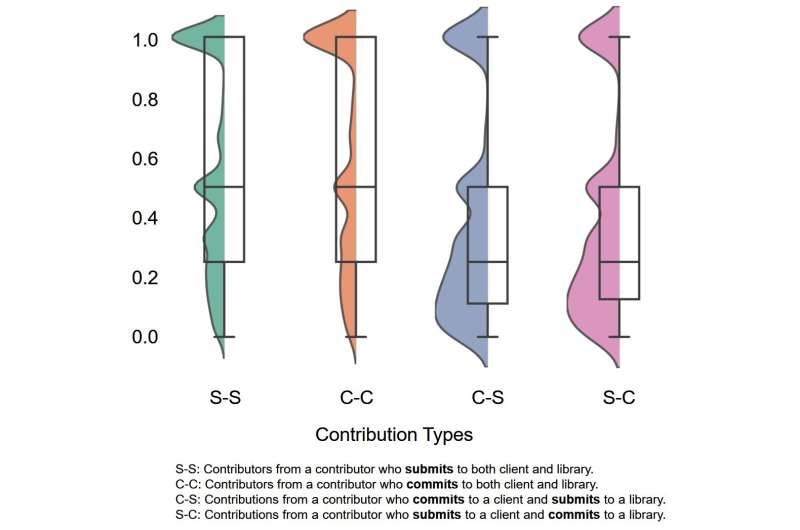
Researchers from Japan have used socio-technical strategies to measure the congruence between the community of contributors to open-source programming libraries and the dependencies of that library throughout the ecosystem. This work means that the extent of matching between the community of contributors and networks of dependencies might be used as an indicator of libraries prone to changing into inactive.
The fashionable pc applications that run your favourite apps or web sites could be extraordinarily giant, usually measured in hundreds of thousands of traces of code. That is clearly way more advanced than could be dealt with by anybody particular person. Most programming languages subsequently depend on specialised modules known as third-party libraries to perform particular duties. These libraries are sometimes open-source and freely out there to anybody who needs to obtain and use them.
For instance, programmers in JavaScript have entry to over a million libraries, whereas there are greater than 300,000 libraries for the Python neighborhood. The libraries themselves usually depend on one another, with the standard library requiring the usage of about 5 others. Nonetheless, the ecosystem of interconnected libraries and their dependencies on one another is poorly understood, which is regarding since a failure in a single might have cascading results on the whole system.
Sustained contributions are essential, as a result of the dependencies of anybody library on others have to be consistently up to date in response to modifications. Nonetheless, maintainers of those libraries are sometimes overworked and sometimes contribute as unpaid volunteers.
Now, a staff of researchers at Nara Institute of Science and Expertise (NAIST) studied these networks by defining a metric known as “dependency-contribution congruence” (DC congruence), which measures how carefully the community of library dependencies matches the community of contributor modifications. The congruence metric is largest when the identical contributor makes modifications to each a library and its dependents.
“We discovered that DC congruence shares an inverse relationship with the chance {that a} library turns into dormant. Particularly, a library is much less more likely to develop into dormant if the contributions are congruent with upgrading dependencies,” says first writer Supatsara Wattanakriengkrai. The staff measured the DC congruence throughout the npm ecosystem of JavaScript libraries and analyzed over 5.3 million change commits throughout 107,242 completely different libraries.
“Peaks in our generated metrics correlate with essential ecosystem occasions,” says senior writer Kenichi Matsumoto.
This analysis might assist maintain software program working and determine fragile factors within the dependency community, and will finally encourage dependency contributions that assist the upkeep of interdependent third-party libraries utilized in software program improvement.
The examine is printed within the journal IEEE Transactions on Software program Engineering.
Supatsara Wattanakriengkrai et al, Giving Again: Contributions Congruent to Library Dependency Modifications in a Software program Ecosystem, IEEE Transactions on Software program Engineering (2022). DOI: 10.1109/TSE.2022.3225197
Offered by
Nara Institute of Science and Expertise
Quotation:
Community evaluation to determine open-source software program libraries about to develop into dormant (2022, December 21)
retrieved 25 December 2022
from https://techxplore.com/information/2022-12-network-analysis-open-source-software-libraries.html
This doc is topic to copyright. Other than any truthful dealing for the aim of personal examine or analysis, no
half could also be reproduced with out the written permission. The content material is offered for data functions solely.











![The Most Visited Websites in the World [Infographic]](https://newselfnewlife.com/wp-content/uploads/2025/05/Z3M6Ly9kaXZlc2l0ZS1zdG9yYWdlL2RpdmVpbWFnZS9tb3N0X3Zpc2l0ZWRfd2Vic2l0ZXMyLnBuZw.webp-120x86.webp)













